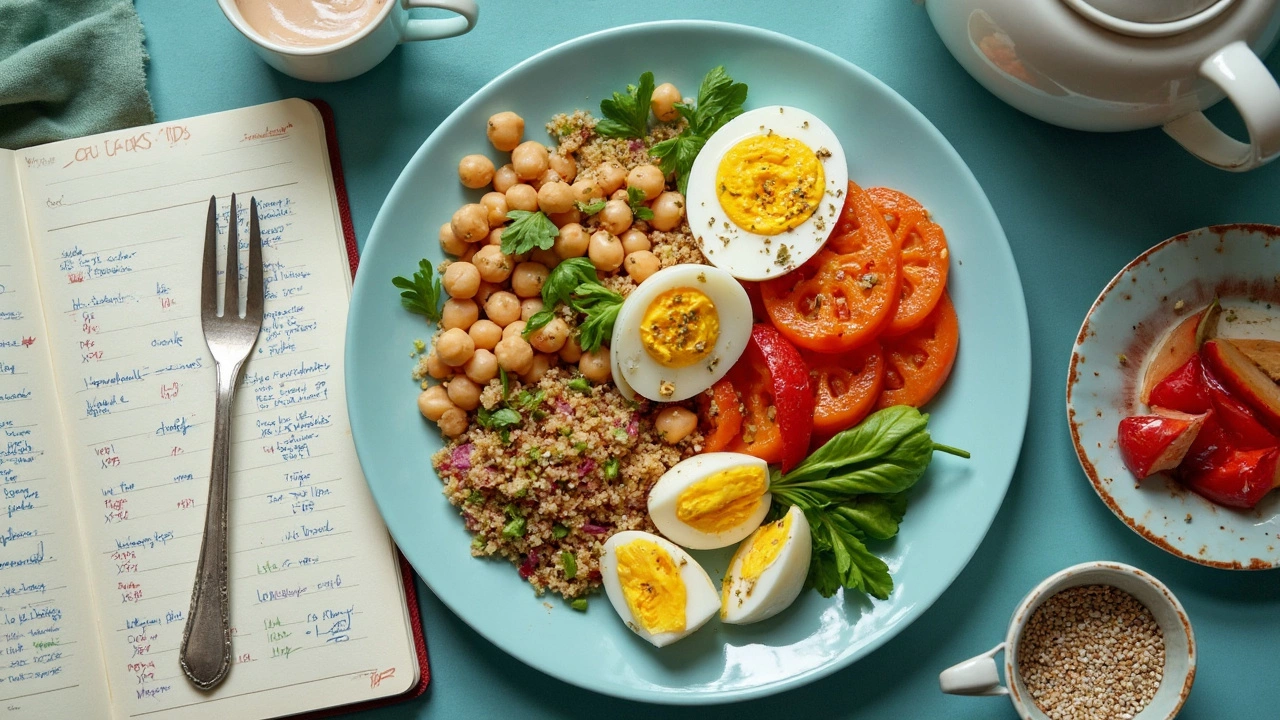Protein is everywhere—especially in fitness blogs and food ads. But if you’re sticking with a vegetarian diet, you probably ask yourself: are two eggs a day really enough? Let’s be real: just grabbing eggs every morning won’t get the job done for everyone. Eggs are tasty and easy to cook, but when it comes to meeting your protein targets, the answer depends on your age, size, and lifestyle.
Here’s something simple to remember: each egg packs about 6 grams of protein. That means two eggs offer you 12 grams. Sounds decent, but most adults need somewhere between 50 and 70 grams a day—more if you’re active or trying to build muscle. For a lot of folks, two eggs only cover a small part of what your body needs.
If you’re serious about nutrition, you can’t rely on eggs alone. There are plenty of smart ways to add extra protein, even if you’re not into eating meat. Think Greek yogurt, cottage cheese, lentils, nuts, and even tofu—all with their own benefits and easy to toss into your meals. Plus, you don’t have to whip up anything complicated. Even sprinkling some seeds or beans into salads or soups can make a big difference.
- How Much Protein Do You Really Need?
- Cracking the Numbers: How Much Protein in 2 Eggs?
- How 2 Eggs Fit in a Vegetarian Diet
- Quick Ways to Boost Protein with Plants
- Easy Vegetarian Recipes With Extra Protein
How Much Protein Do You Really Need?
Let’s make this crystal clear: the magic protein number isn’t the same for everyone. The usual advice you’ll hear is about 0.8 grams of protein per kilogram of body weight each day. To see what that looks like, just multiply your weight in kilograms by 0.8. For example, if you weigh 70 kg (about 154 pounds), you’ll want around 56 grams of protein daily. If you’re active, aiming for muscle, pregnant, or over 60, you might need even more. Some experts recommend getting up to 1.2 grams per kg in those cases.
Why care so much about hitting your protein goal? Protein isn’t just for bodybuilders; your skin, hair, bones, and immune system all need it every day. Without enough, your body gets tired, loses muscle, and takes longer to heal. No energy drinks or superfoods will make up for a day-to-day protein shortfall.
- If you're a regular guy or gal with a desk job, hovering around 50–70 grams each day keeps you in the safe zone.
- If you work out hard or play sports, aim for 1–1.2 grams per kg (70–85 grams if you’re 70 kg).
- Older adults and pregnant folks can also bump their numbers closer to that high end for better strength and health.
No need to turn meal planning into rocket science—but checking a food label or tracking a few days in an app can keep you honest. If you eat a vegetarian diet, being aware of your egg protein intake and the totals from your other foods keeps everything running smooth. Sometimes, just tweaking a snack or adding a scoop of Greek yogurt makes all the difference.
Cracking the Numbers: How Much Protein in 2 Eggs?
Let’s cut to the chase—if you’re eating two eggs, you’re getting about 12 grams of protein in total. Why? Each medium egg gives you roughly 6 grams. Size matters a bit: large eggs might hit 6.5 grams but don’t expect anything wild. No matter how you cook them, the protein count barely changes, so scrambled or boiled makes almost no difference.
To make it clearer, here’s a quick chart:
| Egg Size | Protein per Egg (g) | Protein in 2 Eggs (g) |
|---|---|---|
| Small | 5 | 10 |
| Medium | 6 | 12 |
| Large | 6.5 | 13 |
| Extra Large | 7 | 14 |
Now, if you check food labels or the USDA, this is right in line with what they report. Compared to other high-protein vegetarian foods, eggs give you a solid punch in a small package, but there’s a limit to what you get from just two. A cup of cooked lentils, for instance, has about 18 grams of protein—more than two eggs put together.
So, where does this land in your diet? If you’re aiming for the standard 50 grams a day, two eggs get you only about one-quarter of the way there. For anyone on a egg protein kick, it’s good—but not a full solution. If you’re young, older, super active, pregnant, or recovering from illness, your protein targets might be even higher.
Long story short: eggs are a handy boost, but not the whole answer for your daily protein needs.

How 2 Eggs Fit in a Vegetarian Diet
If you’re eating vegetarian, eggs usually make life a lot easier. They’re quick, cheap, and fill in the gaps some plant foods leave open. Two eggs land you about 12 grams of high-quality protein, which is great compared to other single foods. But here’s the reality: eggs shouldn’t carry the whole load for your egg protein needs. Mixing things up keeps your diet balanced and helps you cover all the bases—vitamins, minerals, and, of course, protein.
Check out how two eggs measure up next to some common vegetarian meals:
| Food / Meal | Serving Size | Protein (grams) |
|---|---|---|
| 2 Eggs | Large | 12 |
| 1 cup Greek Yogurt | 245g | 10-20 |
| 1 cup Cooked Lentils | 200g | 18 |
| ½ cup Cottage Cheese | 110g | 13 |
| 2 tbsp Peanut Butter | 32g | 7 |
Eggs have another perk: they provide all nine essential amino acids, so your body uses this protein more efficiently than, say, what you get from most grains or beans alone. That makes eggs a solid foundation—but even with these benefits, relying on just two eggs a day will likely leave you short, especially if you don’t eat dairy or beans regularly.
Don’t forget cholesterol. Two eggs contain about 370 mg, which is more than the previous daily limit recommended in older guidelines. While experts now say most healthy people don’t need to stress about eating eggs daily, if you have high cholesterol or heart disease, talk to your doc to make sure you’re good.
Bottom line: eggs and plant protein work better together. Mixing eggs with foods like beans, yogurt, and seeds helps you hit your protein goals, get a variety of vitamins, and keep meals interesting. Changing things up also makes your diet easier to stick with over time.
Quick Ways to Boost Protein with Plants
So, you’ve figured out that two eggs a day won’t meet your protein needs. Luckily, you’ve got tons of plant-based options to pick up the slack. Whether you want something quick or you’re cool with a bit of prep, it’s literally all about sneaking in extra bites here and there. No drama, no hunting for oddball ingredients.
Some plant foods pretty much hold their own against eggs when it comes to protein. Beans, lentils, tofu, tempeh, and edamame are your go-tos. Even a small handful of nuts or seeds adds up if you snack on them or toss them on salads and oatmeal. Check this out—here’s a simple table showing the protein punch of common vegetarian foods, per cooked or ready-to-eat serving:
| Food | Serving Size | Protein (grams) |
|---|---|---|
| Lentils (cooked) | 1 cup | 18 |
| Chickpeas (cooked) | 1 cup | 15 |
| Tofu (firm) | 100g (about half a cup) | 8 |
| Edamame (shelled) | 1 cup | 17 |
| Greek yogurt (plain, low-fat) | 170g (1 small tub) | 15 |
| Peanut butter | 2 tbsp | 8 |
| Pumpkin seeds | 1/4 cup | 9 |
Boosting your daily protein isn’t a headache if you work plant foods into everyday meals. Try these ideas if you want it painless or nearly automatic:
- Egg protein is good—but bulk up breakfast by tossing tofu cubes into that veggie scramble or stirring hemp seeds into your oatmeal.
- Swap mayo or cheese in sandwiches with hummus. It tastes great and adds a decent chunk of protein.
- Pick Greek yogurt (not the sweet stuff) as a snack or use it instead of sour cream. Double protein, half the guilt.
- Add chickpeas or lentils into soups, stews, and pasta sauces—they soak up flavor and are super filling.
- Bake protein into snacks by tossing nuts or seeds into homemade bars or muffins.
- Always have canned beans on hand—open, rinse, add to pretty much anything.
If you look at your plate and notice only bread, rice, or noodles, just throw in a scoop of beans or a few spicy tofu cubes. That alone can take you from under to over the line when it comes to daily protein.

Easy Vegetarian Recipes With Extra Protein
If you want more protein in your vegetarian meals, you don’t need fancy ingredients or hours in the kitchen. You just need some simple swaps and a few easy recipes.
First up, breakfast: Try a Greek yogurt parfait. Plain Greek yogurt gives you about 10 grams of protein per 100 grams, and you can layer it with fruit and a sprinkle of seeds. You can toss in granola, but look for one that’s high in fiber, not just sugar. Another solid option is a tofu scramble. Half a block of firm tofu adds up to 20 grams of protein. Sauté it with some veggies, a bit of turmeric, and black salt if you want that classic egg flavor.
If you’re after quick lunches, chickpea salad is a winner. Just mix a can of rinsed chickpeas (which brings about 15 grams of protein), chopped cucumbers, tomatoes, and a simple olive oil dressing. Add some feta cheese if you eat dairy, and you’ll bump it up even more.
Dinner doesn’t have to be complicated. Try a red lentil curry—one cup of cooked lentils will get you roughly 18 grams of protein. Serve it with brown rice or a whole-grain pita to round out the meal. If you’re bored with lentils, go for a black bean quesadilla. Load a tortilla with mashed black beans (half a can equals 7 grams of protein), your favorite veggies, and a little cheese, then toast until golden.
Snacks matter too. Grab a handful of roasted edamame, or spread peanut butter on whole grain toast. Even a protein smoothie with soy milk and nut butter can get you an extra boost. Remember, the key to hitting your egg protein and daily needs is mixing it up—variety makes sticking to your vegetarian plan way easier.
- Greek yogurt parfait: Layer 200g Greek yogurt, fresh berries, sliced banana, and 1 tbsp chia seeds.
- Tofu scramble: Sauté crumbled tofu, spinach, diced bell pepper, 1 tsp turmeric, and black salt for egg flavor.
- Chickpea salad: Mix 1 can chickpeas, chopped cucumber, tomato, parsley, lemon juice, olive oil, and feta.
- Red lentil curry: Simmer 1 cup red lentils with diced tomatoes, onion, garlic, curry powder, and serve with rice.
- Black bean quesadilla: Fill whole wheat tortilla with mashed black beans, corn, onions, cheese; cook until crispy.
Bottom line? You’ve got countless ways to raise your protein game as a vegetarian. Use these recipes as a starting point, and don’t be afraid to mix and match ingredients to keep your meals fresh and filling.

